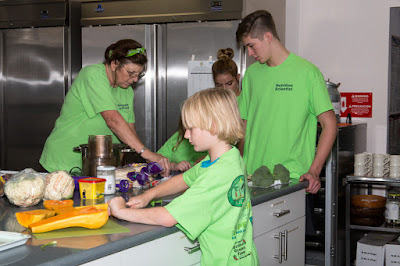"Good manners: The sound you don't make when you're eating soup."
--Bennett Cerf
Winter is
all about comfort foods and soup tops my list of favorite comfort foods. Easy to prepare, affordable and accessible ingredients, and only one pot!
In our Growing
Healthy Kids workshops for children at risk for obesity and obesity-related diseases such as diabetes, everyone learns how to prepare at least one soup
recipe. There is something spiritual
about chopping and dicing vegetables, adding homemade vegetable broth, and letting soup simmer as
the kitchen fills with wonderful, healing aromas. Make a pot of soup, add a green salad and
homemade cornbread and you have a feast every time.
Be mindful of the time you spend sharing meals with your family. Create mealtime traditions. Make your family’s favorite comfort foods with your kids. Set the table, add a vase of flowers or
greenery from the yard. Have the kids fill the water
glasses. Turn off all the cell phones and put them in another room. When you sit down to eat dinner, share what happened in your day,
talk about what you are grateful for, and help each other set goals for
the next day.
Several weeks ago I
reposted a photo of one of my favorite butternut squash soups from the Growing Healthy Kids
Test Kitchen. A friend on the other side of the country saw the picture and asked me to share the recipe. Enjoy!
GROWING HEALTHY KIDS: Our Recipe collection
CURRIED BUTTERNUT
SQUASH SOUP
INGREDIENTS:
- 1 tablespoon coconut or olive oi
- 2 shallots, thinly sliced·
- 3 cloves garlic, minced
- 1 small butternut squash, peeled and cubed
- pinch of pink Himalayan sea salt and black pepper
- 2 Tablespoons curry powder
- ¼ teaspoon cinnamon (I recommend Ceylon cinnamon)
- 1 14-ounce can full fat coconut milk
- 2-3 cups vegetable broth
- 2 Tablespoons maple syrup
- 1 teaspoon chili garlic paste (optional)
DIRECTIONS:
Heat large soup pot over medium hot.
Add oil, shallots, and garlic. Sauté for 2 minutes, stirring frequently,
Add squash, salt, pepper, curry powder, and cinnamon. Stir. Cover and cook for 4 minutes, stirring occasionally.
Add coconut milk, vegetable broth, maple syrup and chili garlic paste.
Bring to a low boil over medium heat and then reduce heat to low. Cover and simmer for 15 minutes or until butternut squash is fork tender.
Use immersion blender and puree on high until creamy and smooth.
Taste and adjust seasonings. Cook a few more minutes over medium heat.
Serve with lightly toasted pumpkin seeds and smoked paprika.
Growing Healthy Kids -- working to improve the health - and lives - of America's children, one child at a time.
Add oil, shallots, and garlic. Sauté for 2 minutes, stirring frequently,
Add squash, salt, pepper, curry powder, and cinnamon. Stir. Cover and cook for 4 minutes, stirring occasionally.
Add coconut milk, vegetable broth, maple syrup and chili garlic paste.
Bring to a low boil over medium heat and then reduce heat to low. Cover and simmer for 15 minutes or until butternut squash is fork tender.
Use immersion blender and puree on high until creamy and smooth.
Taste and adjust seasonings. Cook a few more minutes over medium heat.
Serve with lightly toasted pumpkin seeds and smoked paprika.
Growing Healthy Kids -- working to improve the health - and lives - of America's children, one child at a time.
With love,
Nancy
Heinrich, MPH
Founder and
Wellness Architect
Growing
Healthy Kids, Inc.








